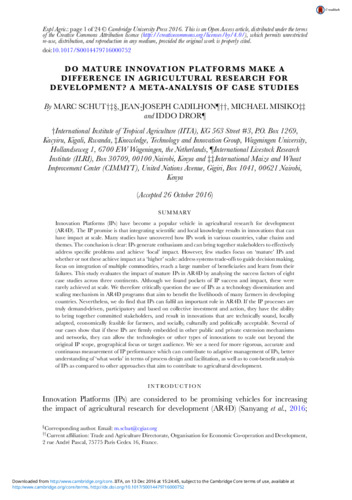Do mature innovation platforms make a difference in agricultural research for development? a meta-analysis of case studies
Abstract
Innovation Platforms (IPs) have become a popular vehicle in agricultural research for development (AR4D). The IP promise is that integrating scientific and local knowledge results in innovations that can have impact at scale. Many studies have uncovered how IPs work in various countries, value chains and themes. The conclusion is clear: IPs generate enthusiasm and can bring together stakeholders to effectively address specific problems and achieve ‘local’ impact. However, few studies focus on ‘mature’ IPs and whether or not these achieve impact at a ‘higher’ scale: address systems trade-offs to guide decision making, focus on integration of multiple commodities, reach a large number of beneficiaries and learn from their failures. This study evaluates the impact of mature IPs in AR4D by analysing the success factors of eight case studies across three continents. Although we found pockets of IP success and impact, these were rarely achieved at scale. We therefore critically question the use of IPs as a technology dissemination and scaling mechanism in AR4D programs that aim to benefit the livelihoods of many farmers in developing countries. Nevertheless, we do find that IPs can fulfil an important role in AR4D. If the IP processes are truly demand-driven, participatory and based on collective investment and action, they have the ability to bring together committed stakeholders, and result in innovations that are technically sound, locally adapted, economically feasible for farmers, and socially, culturally and politically acceptable. Several of our cases show that if these IPs are firmly embedded in other public and private extension mechanisms and networks, they can allow the technologies or other types of innovations to scale out beyond the original IP scope, geographical focus or target audience. We see a need for more rigorous, accurate and continuous measurement of IP performance which can contribute to adaptive management of IPs, better understanding of ‘what works’ in terms of process design and facilitation, as well as to cost-benefit analysis of IPs as compared to other approaches that aim to contribute to agricultural development.

